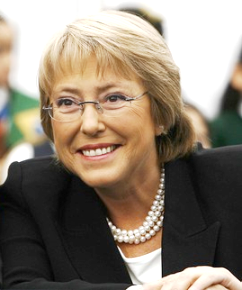New York, September 14, 2010 — The Gender Equality Architecture Reform (GEAR) Campaign is thrilled that the United Nations Secretary General, Ban Ki-moon has chosen Michelle Bachelet as the new Under-Secretary-General (USG) of UN Women. This appointment is essential to the effectiveness of the new entity and the campaign is pleased that the UN SG has selected a qualified and strong leader for this high level UN position that will envision and work for the future of women’s rights and advocate for women worldwide.
“Michelle Bachelet is a top notch choice and has long been one of GEAR’s dream candidates. An effective leader of great integrity, Bachelet has demonstrated strong commitment to women’s empowerment and the ability to shape gender equality policies in a variety of areas. She also has the stature to mobilize the resources crucial to make UN Women a success,” stated Charlotte Bunch, Center for Women’s Global Leadership (CWGL) at Rutgers University and a founding member of the GEAR Campaign.
The GEAR Campaign has developed criteria and questions for the new USG and is eager to begin conversations with her regarding her vision for UN Women. The campaign requests an open dialogue with civil society about the key priorities of the new entity and how UN Women will become a powerful voice for women and girls at the global, regional and local levels. As the new entity is being developed, civil society wants to be consulted and would like to hear from Bachelet how she plans to ensure meaningful participation with civil society and particularly women’s organizations from grassroots to international groups.
Bani Dugal of the Bahá’í International Community UN office shared that, “it is our hope that her experience of leadership in the international arena, her dedication to the advancement of women and girls, and her commitment to working with civil society and the women’s movement will guide the work of this ground-breaking entity and rally member states to strengthen their efforts to achieve the equality of women and men.”
This landmark decision comes at a critical juncture as the UN reforms its internal systems and has recently been seen as an exhausted and under-resourced international institution. UN Women can provide new vision and hope and will need to bridge governments and civil society as we progress into the 21st century and the GEAR Campaign will be there to support its leadership and maintain visibility throughout the transitional period and beyond.
Contact:
Charlotte Bunch, 732-642-5271 or cbunch@igc.org,
Bani Dugal, 646-404-4210 or bdugal@bic.org
Download the GEAR Press Release here.
Also, you can find the Secretary General’s transcript announcing Ms. Bachelet as the Head of UN Women here: http://www.unwomen.org/2010/09/secretary-generals-press-encounter-announcing-ms-michelle-bachelet-as-head-of-un-women/.
Background
The GEAR Campaign is a network of over 300 women’s, human rights and social justice groups around the world that have been working for over four years to gain UN Member States and UN Secretariat approval for creation of a larger more coherent coordinated UN agency that can advance further the UN’s mandate of working for gender equality as a crucial component of development, human rights, humanitarian concerns, peace and security.
The new gender equality entity to be headed by an Under-Secretary-General, will consolidate the four existing UN bodies on women, increase operational capacity at the country level and gain increased funding for work on women’s empowerment and advancement. The UN currently has four separate entities dedicated to women’s issues which will be combined in the new entity: the UN Development Fund for Women (UNIFEM), the Division for the Advancement of Women (DAW), the International Research and Training Institute for the Advancement of Women (INSTRAW), and the Office of the Special Adviser to the UN Secretary-General on Gender Issues and Advancement of Women (OSAGI). Combining these agencies and coordinating their work more with gender mainstreaming throughout the UN system will enable the UN and governments to deliver more effectively on their obligations and commitments to advance gender equality, women’s empowerment and women’s human rights.



